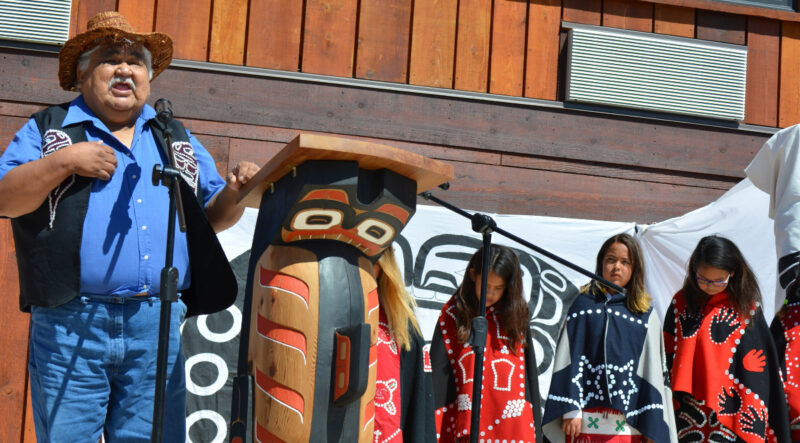First Nations want ‘Aquaculture Zone’ off Vancouver Island
“We are working towards sustainability of both fisheries and aquaculture…they can both exist in our waters, but it should be our community that decides what that looks like for our Traditional Territory,” – The Gwa’sala-‘Nakwaxda’xw Nations
By Fabian Dawson
SeaWestNews
Two First Nations in British Columbia are calling for the creation of an Aquaculture Zone in its traditional territory, where it plans to administer the licensing regimes for salmon and shellfish farms while ensuring wild stocks are not overfished.
The Gwa’sala-‘Nakwaxda’xw Nations (GNN), whose traditional territory stretches from the northern tip of Vancouver Island to the lands and waters located around the Great Bear Rainforest in BC’s central coast, said the proposed North Island Aquaculture Zone will be a key milestone on the path to self-governance.
“We are working towards sustainability of both fisheries and aquaculture…they can both exist in our waters, but it should be our community that decides what that looks like for our Traditional Territory,” said Ethan Shaw, GNN’s Salmon Farm Monitor.
The Gwa’sala-‘Nakwaxda’xw , are two Nations which were amalgamated under the Indian Act, after they were forced to relocate from their traditional territories to Port Hardy in 1964.
It has overlapping and/or shared territory with its First Nation neighbours – Kwicksutaineuk, Kwa-wa-aineuk, Kwakiutl, ’Namgis, Tlatlasikwala, Tsawataineuk, and Wuikinuxv.
At an event today to celebrate Indigenous leadership in aquaculture and BC’s coastal marine economy, the Gwa’sala-‘Nakwaxda’xw announced that it is developing a Memorandum of Understanding (MOU) with their neighbour Nations towards building co-governance as part of a North Island Aquaculture Zone.
“This is an opportunity for us to study the impacts of the farms and ensure that our fish, shellfish, seaweed and all other life remain healthy so that we have food for our community on a regular basis,” said Shaw.
Fish farmer, Mowi Canada West operates five salmon farms in partnership with Gwa’sala-‘Nakwaxda’xw.
The licences for these five salmon farms, and 74 others, which are set to expire on June 30, have been in limbo after the government decided to phase out salmon farms in BC’s Discovery Islands as part of a wider pre-election promise to develop a plan by 2025 to transition all open net salmon farms on the west coast.
According to a financial report, British Columbia’s indigenous and non-Indigenous coastal communities will lose more than 4,700 jobs and $1.2 billion in economic activity annually, if the 79 salmon farming licences are not renewed.
At the event in Port Hardy today, where two tugs and two barges belonging to GNN’s K’awa’tsi Marine business were blessed in a traditional community ceremony, the Gwa’sala-‘Nakwaxda’xw also called on the Federal Government to immediately renew the licences.
GNN’s K’awa’tsi Marine business has been working for the salmon farms along the BC Coast for 9 years, hauling feed, transporting crews, and delivering specialty equipment and services. The company now provides about $9 million in direct annual revenue and 23 jobs, with 16 of those filled by Indigenous people.
“Rural communities and their people need stable, family-supporting jobs to stay and support British Columbia and Canada in supplying healthy seafood to a growing world population,” said GNN Hereditary Chief Paddy Walkus.
“We have witnessed the decline of our wild fish in Smith Inlet where there are no farms. We need to take a stand and do right by our ancestors – and that means doing what it takes for our community by developing an economic base for self-government and self-determination,” he said, “The Gwa’sala-‘Nakwaxda’x people are committed to creating and sharing a prosperous future for ourselves and for our local communities. This is what reconciliation looks like. It’s happening in communities like Port Hardy. It makes the future look hopeful.”
Today’s event, follows calls by a coalition of BC First Nations which urged the Federal Government to respect their Indigenous rights and title and immediately re-issue the soon-to expire salmon farming licences in their traditional territories.
“Our coalition is opposed to the federal government disregarding science and bowing to unfounded activist claims on salmon farming that, if heeded, will severely damage our communities, and deny our rights and title,” said the coalition in a statement.
“Salmon farming has lifted entire coastal Indigenous communities out of poverty. It injects money into our communities, creates meaningful employment for our members, provides opportunities for First Nations-owned business to supply the sector, and funds projects that contribute to the wellness of our people and wild salmon,” it said.
The coalition’s survey showed that direct economic benefits to First Nations in coastal BC exceed $50 million annually through more than 276 full time jobs, benefit payments, and contracts with indigenous-owned companies.
Federal Fisheries Minister, Joyce Murray, has said ‘the decision (on the 79 expiring salmon farm licences) will be made when it needs to be made” while BC Premier John Horgan has expressed his concerns about the job losses and indigenous rights if the licences are lost.
The BC Chamber of Commerce, representing approximately 100 chambers of commerce and boards of trade across the province, has also sent a letter of concern to Minister Murray strongly encouraging the federal government to renew the 79 licences “to provide certainty to affected businesses and their employees.”
“We also ask your government to engage in meaningful dialogue with Indigenous Peoples, communities, and the salmon aquaculture sector to develop a sustainable path forward. To date, we are concerned that the federal government has not lived up to its promise to properly consult on the proposed transition,” read the letter by Fiona Famulak , President and CEO of the Chamber.
“As you well know, the pandemic has had a devastating impact on small communities across B.C. As we begin to slowly emerge from the pandemic, now is not the time to deliver another crushing economic blow to these communities.”
(File Image shows Paddy Walkus, Hereditary Chief of Gwa’sala-Nakwaxda’xw Nation, speaking at the official opening of the Kwa’lilas Hotel in Port Hardy)

